

Expecting the Unexpected: An Interview With Edmund Phelps. In 2006, the Royal Swedish Academy of Sciences awarded the Nobel Memorial Prize in Economic Sciences to Edmund Phelps "for his analysis of intertemporal tradeoffs in macroeconomic policy.
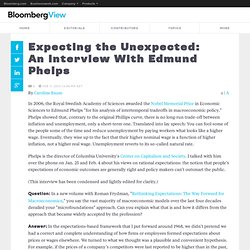
" Phelps showed that, contrary to the original Phillips curve, there is no long-run trade-off between inflation and unemployment, only a short-term one. Translated into lay speech: You can fool some of the people some of the time and reduce unemployment by paying workers what looks like a higher wage. Eventually, they wise up to the fact that their higher nominal wage is a function of higher inflation, not a higher real wage. Unemployment reverts to its so-called natural rate. Phelps is the director of Columbia University's Center on Capitalism and Society.
(This interview has been condensed and lightly edited for clarity.) Q: So how did adaptive expectations morph into rational expectations? Q: And what's the consequence of this putsch? A: Craziness for one thing. Pathologies of Rational Choice Theory - Green, Donald; Shapiro, Ian. Donald Green and Ian Shapiro This is the first comprehensive critical evaluation of the use of rational choice theory in political science.
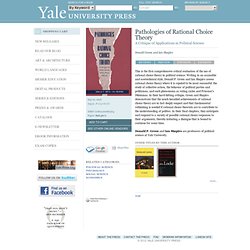
Writing in an accessible and nontechnical style, Donald P. Why rational expectations models can be wrong. Washington University professor David Levine has a pair of articles (article 1, article 2) in the Huffington Post about why financial crises can't be predicted, and why rational expectations theories are the only good theories in economics.
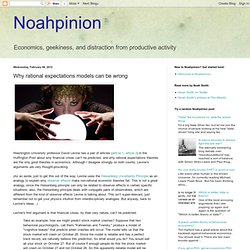
Although I disagree strongly on both counts, Levine's arguments are very thought-provoking. Levine's first argument is that financial crises, by their very nature, can't be predicted: Take an example: how we might predict stock market crashes? Suppose that two behavioral psychologists, call them "Kahneman and Tversky," produce a model of "cognitive biases" that predicts when crashes will occur. The model tells us that the stock market will crash on October 28. This is similar to an argument made by Levine's colleague Stephen Williamson. Conditional predictions are different than unconditional predictions. As a side note, even in cases where Levine is right, this does not make modeling crises a useless exercise. But notice the logic behind this idea. Rationality for Mortals: Gerd Gigerenzer. Sequel to Gigerenzer's last OUP volume Adaptive ThinkingBy an influential social psychologistGerd Gigerenzer's influential work examines the rationality of individuals not from the perspective of logic or probability, but from the point of view of adaptation to the real world of human behavior and interaction with the environment.
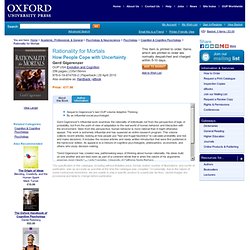
Seen from this perspective, human behavior is more rational than it might otherwise appear. This work is extremely influential and has spawned an entire research program. This volume collects recent articles, looking at how people use "fast and frugal heuristics" to calculate probability and risk and make decisions. It includes the revised articles and newly written introduction that were first published in the hardcover edition.
Its appeal is to a mixture of cognitive psychologists, philosophers, economists, and others who study decision making. "Gerd Gigerenzer has created new, pathbreaking ways of thinking about human rationality. Medema, S.G.: The Hesitant Hand: Taming Self-Interest in the History of Economic Ideas. Adam Smith turned economic theory on its head in 1776 when he declared that the pursuit of self-interest mediated by the market itself--not by government--led, via an invisible hand, to the greatest possible welfare for society as a whole.
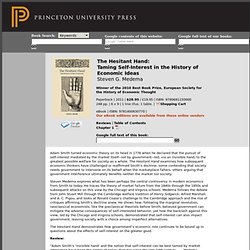
The Hesitant Hand examines how subsequent economic thinkers have challenged or reaffirmed Smith's doctrine, some contending that society needs government to intervene on its behalf when the marketplace falters, others arguing that government interference ultimately benefits neither the market nor society. Steven Medema explores what has been perhaps the central controversy in modern economics from Smith to today. He traces the theory of market failure from the 1840s through the 1950s and subsequent attacks on this view by the Chicago and Virginia schools. Medema follows the debate from John Stuart Mill through the Cambridge welfare tradition of Henry Sidgwick, Alfred Marshall, and A. C. Review: More reviews. The possibility for altruism.